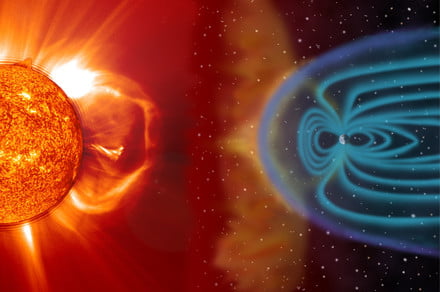The Earth is protected from space radiation by its magnetosphere. NASA / SOHO
Out in the depths of space, far from the protection of Earth’s atmosphere, radiation lurks. Space radiation is known to cause sickness and increase the lifetime risk of cancer in astronauts, and now scientists have published a study showing that exposure to space-like radiation can cause damage to the brains of mice and affect their behavior.
The scientists took lab mice and exposed them to 1 milliGray of radiation each day, which is the equivalent exposure to deep-space radiation. The experiment lasted for six months. At the end of this period, the scientists examined the mice’s brains to see what had changed.
They found that in two areas of the mice’s brains, the hippocampus and the prefrontal cortex, cellular signaling was impaired. That means the neurons were less able to communicate with each other, which caused learning and memory impairments. Damage to the prefrontal cortex is particularly concerning, as this is the area of the brain responsible for planning and decision making. Impairment in this area of the brain can cause wide-spread cognitive problems which can sometimes be hard to detect.
In addition to the neurological findings, the scientists also looked at the mice’s behavior. They found that that the irradiated mice avoided social interactions when compared to healthy mice, which they believe is a demonstration of anxiety.
It’s important to note that this study was performed in mice, so it is a long way from demonstrating that human astronauts’ brains would definitely be harmed by deep-space radiation. But it does give an indication that we should be looking at radiation’s effects, especially on longer-term missions where astronauts could be exposed to radiation for months or even years at a time, such as planned manned missions to Mars.
The researchers estimated that if their findings were translated to humans (and that’s a big if), one in five astronauts could experience issues like anxiety, learning problems, or other cognitive impairments on long-term missions.
Two of the researchers write in The Conversation that their work “does raise the sobering possibility that galactic cosmic radiation exposure may represent a significant obstacle to deep space travel.” They suggest that to overcome this obstacle, scientists could try to develop a new kind of shielding material to protect astronauts, or create dietary supplements or drugs to mitigate the potentially harmful radiation.
The paper is published in the journal eNeuro.
Editors’ Recommendations
-
NASA’s Mars 2020 rover will pave the way for manned missions to Mars
-
Here’s how you can watch Tuesday’s total solar eclipse over South America
-
Life after launch: Inside the massive effort to preserve NASA’s space artifacts
-
Chernobyl: 10 burning questions we still have after watching the HBO miniseries
-
There may be frozen water on the moon, new study suggests

